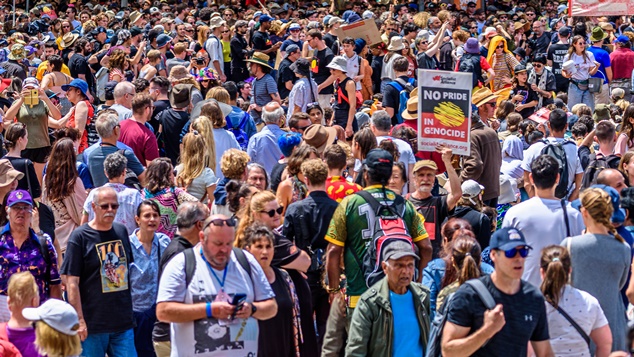
OPINION
Last Monday the United States celebrated Martin Luther King Day. Although for most people it was a day off work, it’s not intended to be a holiday. It is a day set aside to commemorate the life of the great man with acts of community service. Martin Luther King Day is a day of collective national introspection.
It is “a day on work, not a day off work” as the nation pauses to reflect on the injustices perpetrated on so many of its citizens based purely on the colour of their skin. It is the day that America reminds itself that for most of its past, racism formed an irrefutable and unabashed cornerstone of official public policy and that although less formalised and unsanctioned, racism still exists.
Martin Luther King Day is the day each year that America formally acknowledges its racist past and through acts of community service its citizens renew their collective pledge to continue to fight for equality for all.
Australia has no such day.
Other than the superficial tokenism of the non-observed and un-gazetted “Sorry Day”, which commemorates the day that Kevin Rudd apologised to the stolen generations, there is no formal acknowledgement anywhere within Australia’s civic calendar in which we recognise or even mention the horror of historical and continuing racism.
In my view this must change.
This week Australia Day acknowledges the arrival of Lt. James Cook in 1788 and rightly there is much discussion about the appropriateness of celebrating this day. But one doesn’t have to look that far back to find evidence of endemic racism in this country. Indeed Australia’s back-catalogue of systemic and institutionalised racism was enshrined in law as official government policy for every one of the 178 years that passed between Cook’s arrival in 1788 right through to 1975
For most of that time the overarching government policy on Aboriginal people in Australia was based entirely on institutionalised eugenics and remained so right through until the late 1960’s. This repugnant policy was considered to be no more remarkable than breeding a herd of cattle. The proud and ancient culture of the world’s longest surviving civilisation, their art, their language, their ceremonies, their traditions and their spirituality were all to be bred out of them, generation by generation, physiologically overpowered by multi-generational white insemination until their blackness was gone and their culture with it.
But this institutionalised racism wasn’t just reserved for the country’s indigenous people, it guided Australia’s immigration policy as well. Anyone from outside of Australia who had any skin colouring other than pure white was simply not allowed into the country. Character, qualifications, experience and skill meant nothing.
This was not an unspoken convention like the “Don’t ask, don’t tell” convention that the US armed forces applied to the unresolved matter of homosexual servicemen and women. This was fully legislated official government policy with a title deliberately designed so that there could be absolutely no possibility of misinterpretation. It was called “The White Australia Policy”.
In 1901 in his first reading speech, then Attorney general Alfred Deacon explained the purpose of the innocuously named “Immigration Restriction Act” as follows:
“That end, put in plain and unequivocal terms means the prohibition of all alien coloured immigration, and more, it means at the earliest time, by reasonable and just means, the deportation or reduction of the number of aliens now in our midst. The two things go hand in hand, and are the necessary complement of a single policy — the policy of securing a white Australia”.
For me it is almost impossible to comprehend that Australia had a bipartisan endorsed, electorally supported, nationally legislated policy with the staggeringly unambiguous vernacular title; “The White Australia Policy.” And that this policy was not some one-term wonder fuelled by a historical Pauline Hanson either. It was official policy across all political parties and all sides of government from 1901 right through until the late sixties and in fact was only fully mopped up with the passage of Gough Whitlam’s Racial Discrimination Act in 1975 which made the use of racial criteria for any official purpose illegal.
Racism is an irrefutable stain on our nation and stories about contemporaneous standards and comparisons to other countries that attempt to mitigate the gravity of the issue are silenced by the unfathomable scale of the collective racist agenda of Australia’s past.
As we prepare to celebrate the 26th January we too should pause like our American friends, to reflect on the incalculable harm done to so many in this country. As we move forward as a nation we too must place formal recognition of our racist past squarely on the national calendar in the form of an officially gazetted day of reflection.
It is now widely accepted in all quarters of politics that Australia will transition to a republic shortly after the death of Queen Elizabeth II. My suggestion is that Australia change two of its gazetted public holidays when we become a republic.
I suggest that we change January 26 to “First Nations Day”. A day that we all reflect on the way that colonisation so profoundly impacted Australia’s indigenous people. Similarly I suggest that once we become a republic the Queen’s Birthday holiday should become “Australia Day”. The day that we started again, cut our ties with the British monarchy and became a self-governed nation. A kindhearted nation, accepting of everyone, formally acknowledging its past and looking optimistic forward to its bright and enduring future.”
Patrick Coward
Patrick is a business owner and member of Perth’s LGBTIQ+ communities.
Image: Adam Calaitzis (Shutterstock – cropped) Invasion Day Rally in Melbourne 2020.

Love OUTinPerth Campaign
Help support the publication of OUTinPerth by contributing to our
GoFundMe campaign.






